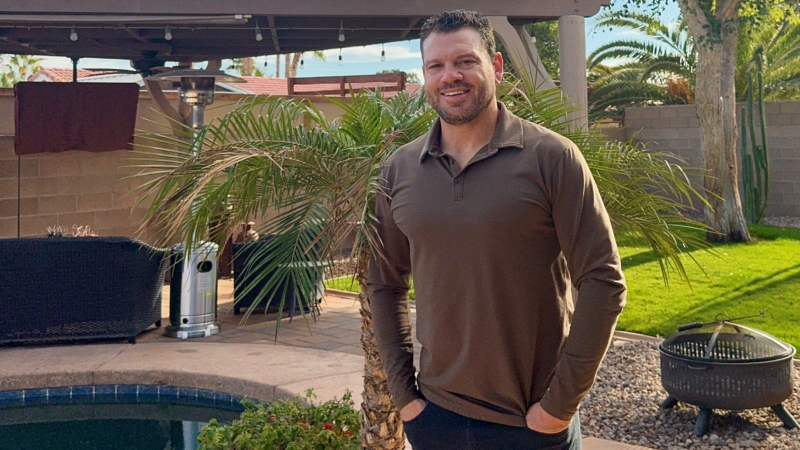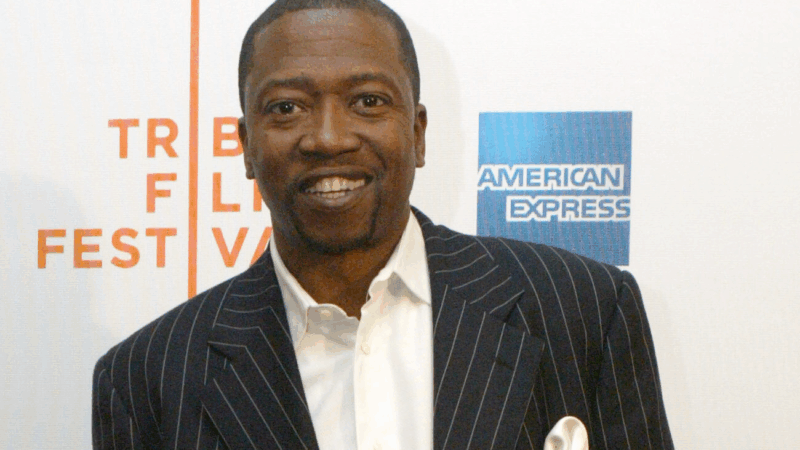With the surge in sports betting, the risk of gambling addiction rises too
“I literally couldn’t stop.”
That’s how Jordan Holt describes the moment that he hit rock bottom with his sports gambling compulsion. The 44-year-old from Yuma, Arizona, says he started placing wagers on football and basketball back in 2007. At first, he says, it felt harmless, but then it quickly spiraled out of control.
“It was an obsession at that point. It was all I could think about. I couldn’t think about anything else in my life, I couldn’t focus on anything, but winning back the money I lost,” he says.
Holt is not alone.
Problem gambling hotlines across the U.S. have seen a surge in calls around major sporting events, especially the Super Bowl. Millions of Americans will be tuning into the Super Bowl this weekend to watch the Philadelphia Eagles face off against the Kansas City Chiefs in New Orleans.
According to the American Gaming Association, nearly $1.5 billion in legal bets are expected during the game, breaking last year’s record of $1.2 billion. It’s estimated that more than one in four American adults will bet on the game, according to the AGA.
“Chasing your losses”
The National Council on Problem Gambling reports that the risk of gambling addiction has increased since the Supreme Court legalized sports betting seven years ago.
According to the council, the risk for gambling addiction in the U.S. rose by 30% between 2018 and 2021. Keith Whyte, the organization’s former executive director, notes that there are several clear red flags that can help identify problem gambling.
“If you become preoccupied with your gambling. If you start to lose control over the amount and time that you spend betting. Most importantly, if it’s causing harm to you. It could be performance issues at work, arguments or lost time with your family,” says Whyte.
Daniel Kotsias is a sports gambling counselor from Oak Park, Michigan. He says the use of smartphones and tablets has made it easier for people to get hooked.
“It’s this constant dopamine on tap on iPhones, they can just tap into it whenever they want,” says Kotsias. He says what separates a gambler from a problem gambler is a phenomenon called “chasing your losses.”
“Some people think that they caused that big win because of of their sports knowledge, but unfortunately because the house always wins, eventually they’ll keep betting to try to win more and they will lose — and that’s when chasing their losses starts to happen,” says Kotsias.
As for Holt, he says he repeatedly tried to quit, even going for days without placing a bet. But then he would get a text message on his phone from FanDuel, an online gambling company.
“When you gamble so much money, they will make you feel good about it and put you in their VIP room,” says Holt. “You have your own personal bookie and one of the perks is that they will always give you bonus bets that ultimately pull you right back in,” says Holt.

Between 2022 and 2024, Holt lost roughly $110,000 — a loss that left him completely disconnected from his life.
“I thought about suicide on numerous occasions. I didn’t feel like I was a valuable member of society anymore. I felt like I wasn’t contributing anything and I just wasn’t meant to be here anymore,” he says.
FanDuel referred NPR to the American Gaming Association, which it’s a member of, for comment. Joe Maloney, the senior vice president for strategic communication, says sports betting companies are dedicated to responsible gaming practices.
“Companies are meeting consumers where they are in the same way the digital transformation allows consumers to use apps to purchase things from groceries to using a phone to take part in legal regulated gambling,” Maloney says. He adds that taxes from the gaming industry helps fund programs to help problem gamblers.
With sports betting reaching record levels, Whyte, from the National Council on Problem Gaming, says it’s the responsibility of the government to set a “level playing field” with stronger gambling regulations.
“There’s too much money on the table for companies to entirely self-regulate or for the government who makes enormous tax revenue off gambling, they’re not always on the side of the consumer,” says Whyte.
What can be done?
The Senate Judiciary Committee took up legislation last year that would regulate sports gambling. The SAFE Bet Act, introduced by Connecticut Democratic Sen. Richard Blumenthal, would create nationwide consumer protections and standards for the mobile sports gambling industry.
“This bill is a matter of public health,” says Blumenthal. “It’s a matter of stopping addiction, saving lives and making sure that young people particularly are protected against exploitation.”
The legislation contains a number of provisions that would regulate sports betting. It prohibits advertising during live sporting events while banning promotions that offer bonus bets, odds boosts and other inducements.
It would force companies to conduct affordability checks on customers, bans deposits via credit cards, and limits customers to five deposits over a 24-hour span.
The bill would also ban companies from using artificial intelligence to track a customer’s gambling habits, which are used to offer individualized promotions as well as “micro-bets” and other AI-powered products.
While the act has garnered bipartisan support in both the House and Senate, some critics worry that its regulatory measures could stifle innovation in a rapidly evolving market. But proponents argue the Safe Bet Act is a necessary step to bring clarity and accountability to an industry that continues to grow in both scale and complexity.
Nearly 40 states — and the District of Columbia — now have some form of legalized gambling.
As for Jordan Holt, he’s in recovery for his gambling addiction. The “diehard Kansas City fan” says Sunday night will be about kicking back with his family, eating sausage and cheese, barbecuing wings — and rooting for the Chiefs.
Bob Weir, guitarist and founding member of the Grateful Dead, has died at 78
For three decades with the Grateful Dead and three more after the group ended following the 1995 death of his bandmate Jerry Garcia, Weir helped build and sustain the band's legacy across generations.
Nationwide anti-ICE protests call for accountability after Renee Good’s death
Activist organizations are planning at least 1,000 protests and vigils this weekend. Officials in major cities cast Saturday's demonstrations as largely peaceful.
Veteran actor T.K. Carter, known for ‘The Thing’ and ‘Punky Brewster,’ dies at 69
T.K. Carter gained fame as Nauls the cook in John Carpenter's 1982 horror classic, "The Thing."
Who is Reza Pahlavi, the exiled Crown Prince encouraging demonstrations across Iran?
In exile for nearly 50 years, Iran's Crown Prince Reza Pahlavi has issued calls urging Iranians to join protests sweeping the country. But support for him may not be clear cut.
US launches new retaliatory strikes against ISIS in Syria after deadly ambush
The U.S. has launched another round of strikes against the Islamic State in Syria. This follows last month's ambush that killed two U.S. soldiers and an American civilian interpreter.
6 killed in Mississippi shooting rampage, authorities say
The alleged gunman, 24, has been charged with murder after the Friday shootings in northeast Mississippi. The victims include his father, uncle, brother and a 7-year-old relative, authorities said.






